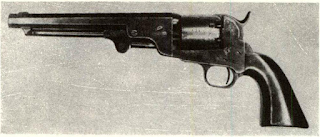Crockett organized the pistol makers and on March
The firm organized by Crockett was styled Tucker,
Crockett now devoted his whole time to the project,
Crockett planned to set the works up as a major
pressment of the guns by the military. He states positively June 30, “We have several hundred on the way
Tucker, Sherrard & Company wanted the Board to
The Board replied, sending out Major George
We are now at work on the third hundred pistols and our
Crockett remarks on the low price the state was
Crockett persistently puts off the Board on the times
mount to $100. On September 24, , the remaining
Crockett again writes, on November 20, now weeks
The writer has devoted his whole time to the business since
Crockett furnishes some astonishing information concerning the manufacture of Colt revolvers, as it was
Colt’s pistols are not pure cast steel and scarcely a piece
We beg leave to assure the Board that out of, we hope,
By January 28 matters had not improved. Though
Six-shooters. We were shown the other day a beautiful
We learn that Col. Crockett has now 400 of these pistols
In an attempt to jack up the ante from the Board,
Possible cause for Crockett’s bringing the contract
Finis cannot be written to the story of the TuckerCrockett pistols. Analysis of the above testimony reveals
A. S. Clark, maker with Sherrard of the dragoonsize revolvers, seems to have worked with Crockett.
I was born in the town of Lancaster, Texas, in , and
A. S. Clark never left Lancaster to go into the Army and
In later years of my life, being related to him by marriage,
I became intimately acquainted with him and have often
It seems he was brought to Lancaster from Michigan, or
The firm organized by Crockett was styled Tucker,
Crockett now devoted his whole time to the project,
Crockett planned to set the works up as a major
pressment of the guns by the military. He states positively June 30, “We have several hundred on the way
Tucker, Sherrard & Company wanted the Board to
The Board replied, sending out Major George
We are now at work on the third hundred pistols and our
Crockett remarks on the low price the state was
Crockett persistently puts off the Board on the times
mount to $100. On September 24, , the remaining
Crockett again writes, on November 20, now weeks
The writer has devoted his whole time to the business since
Crockett furnishes some astonishing information concerning the manufacture of Colt revolvers, as it was
Colt’s pistols are not pure cast steel and scarcely a piece
We beg leave to assure the Board that out of, we hope,
By January 28 matters had not improved. Though
Six-shooters. We were shown the other day a beautiful
We learn that Col. Crockett has now 400 of these pistols
In an attempt to jack up the ante from the Board,
Possible cause for Crockett’s bringing the contract
Finis cannot be written to the story of the TuckerCrockett pistols. Analysis of the above testimony reveals
A. S. Clark, maker with Sherrard of the dragoonsize revolvers, seems to have worked with Crockett.
I was born in the town of Lancaster, Texas, in , and
A. S. Clark never left Lancaster to go into the Army and
In later years of my life, being related to him by marriage,
I became intimately acquainted with him and have often
It seems he was brought to Lancaster from Michigan, or

Comments
Post a Comment